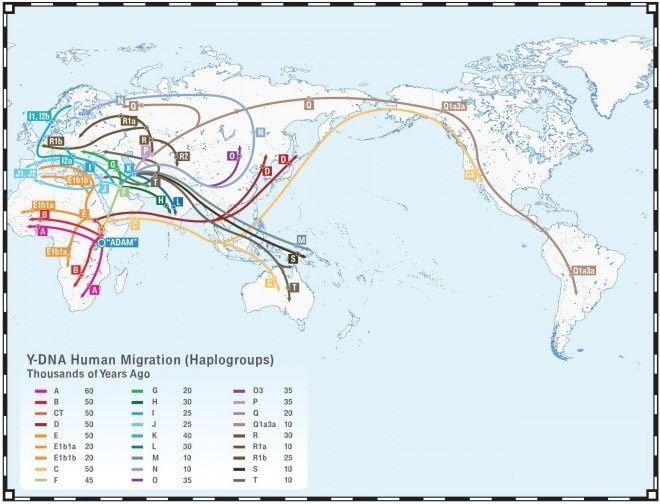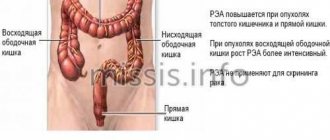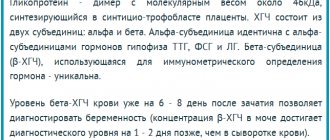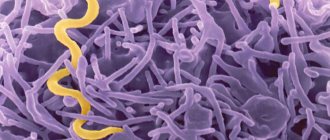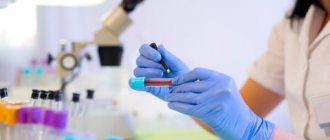Every person has thought about their ethnic origin at least once. The desire to know who your paternal and maternal ancestors were is a natural desire. To do this, you need to conduct a DNA test for nationality by taking DNA samples in our laboratory or from our partners. This genealogical DNA analysis will help you find out about your origins, where your ancestors originated and what migration routes they had to overcome. You will get a 100% result and find out the origin of your family. This is the most technologically advanced and accurate analysis!
By contacting Ralzo, you directly contact the Moscow DNA laboratory and receive the following advantages:
- Consultation with an experienced laboratory specialist in the field of DNA tests;
- Your DNA samples go directly to the laboratory, which significantly increases the reliability and speed of analysis;
- You get the cost of a DNA paternity test at laboratory prices, avoiding intermediaries.
DNA test price for nationality
DNA test price for nationality
9,900 8,000 rub.
Pay
In what situations is a DNA nationality test done?
We will describe just some of the reasons why it is worth conducting a DNA test for nationality in Moscow:
- On the issue of migration to other states;
- To obtain a residence permit in other countries;
- To satisfy your own curiosity;
- As a unique and very unusual gift;
- For submission to government agencies;
- To resolve marriage and family disputes.
The laboratory works with all courts in Moscow and Russia!
DNA analysis on paternal side
By the Y chromosome, which is transmitted only through the male line, one can find out the ethnic origin of a person through the father. The Y-STR test is used to determine recent ancestry, and SNP to study more distant ancestry. In addition to establishing membership in a particular ethnic group and obtaining interesting information about ancestors, a paternal DNA test makes it possible to check the relationship between men without involving the alleged father.
Paternal DNA testing is carried out only for men and is used for various purposes:
- during adoption – to identify biological parents;
- to resolve legal disputes;
- when conducting forensic examinations;
- to establish close or distant relationships;
- when resolving immigration issues;
- to satisfy my own curiosity.
Women do not have Y chromosomes, so male blood relatives are tested to determine paternal ethnicity.
How to pass a genetic test for nationality
DNA tests require samples. The oral scraping of the buccal epithelium, which is located on the inside of the cheek, is accepted as the standard throughout the world. This sample is sometimes called a “saliva test,” but it actually examines the cells remaining on the cotton head while excess water evaporates from the sample. This sample is called standard. Such a sample can be submitted by visiting us in person or at home (see instructions). If the sample was taken at home and stored for several weeks, our laboratory can conduct a DNA paternity test even on this sample.
All other samples are non-standard. These include, for example: liquid and dry blood, hair, personal hygiene items, cigarette butts, nails, biological fluids, etc., see the full list here. The accuracy of paternity testing for standard and non-standard samples is the same! Much depends on the type of sample and its storage conditions, so we recommend that you consult a laboratory specialist by phone.
What causes differences between nationalities
Geneticists' ideas about heredity are much deeper than the generally accepted concept of nationality. Ethnic groups are not only societies of people with a similar haplogroup - the haplogroups of different ethnic groups can either be related or completely different. In this case, relatedness can develop into additional subgroups. Accordingly, many people are representatives of different ethnic groups at the same time, and belong to several subgroups at once.
The genetic differences between peoples that we often observe are not significant and lie in small details. The differences between nations come down to different eye colors, ear shapes, skin color and other minor details. Even the youngest peoples, by the standards of the cosmos, often have unique talents, achievements, technologies, and belonging to any of them does not physiologically determine the breadth of development potential. But cultural and historical potentials and their differences are subjectively observable from the outside.
It is believed that such a difference between haplogroups is due to the same global differences in climate and corresponding all other environmental conditions in which peoples developed for a long time in isolation from others.
Interesting fact: over the course of many years of work in genetic laboratories throughout Russia, it was revealed that 90% of all haplogroups existing throughout the world are found in our country. Our country is literally a “genetic ark” of all humanity.

Where to submit samples for a DNA nationality test in Moscow
There are different ways to provide DNA samples for nationality:
- At the point for receiving samples from our laboratory at any time convenient for you. But for convenience, you can reserve a specific date and time using pre-registration.
- Do it yourself: using cotton swabs purchased at your nearest pharmacy (you can use standard ear cotton swabs).
- Do it yourself: with a free Ralzo kit specially designed for collecting DNA samples yourself.
- Using a free courier order.
Races are a genetic reality
Are there really genetic differences between races? An interesting fact about the concept of “Race” is that many geneticists, and after them biologists, have questioned this concept since the end of the twentieth century, and argue that it is not relevant to modern knowledge. The entire concept of races is built on characteristic physical differences, but for genetics these are just variable mutations that arose within one species under the long-term influence of different climatic zones of human habitation. This is not enough to claim unique heredity, and there is nothing to identify here.
Perhaps partly due to the split in the understanding of the term “Race” in the scientific community, it was easily used as an information weapon in world political games, and was completely discredited by destructive ideologies, often of a religious nature.
Also, genetic discoveries came into conflict with the ideas of racial superiority, which are trying to rely on psychology and eugenics. On the one hand, genetic studies have shown that humanity has genetically unique characteristics that are territorially bound, and at the same time, the DNA of people is 99.9% the same, which makes the racial theory meaningless.
It got to the point that in the process of comparative experiments, scientists found that the difference in DNA between representatives of different nationalities with clear distinctive features is less than that of chimpanzees within the same pack. What makes each of us unique are hundredths of a percent of our total genetic potential.
These same hundredths of a percent include environmental differences between races: way of life, culture, political structure of the country, the development of its economy and the standard of living of the population, the availability of medicine and education. In a word, the differences between people of different nationalities often come down to aspects of a social nature. To what economic conditions society lives in, and to what extent these conditions allow a person to reveal his creative potential. The same peoples who, in unfavorable conditions, can show a tendency towards violence and self-destruction as a whole society, will show unique characteristics and talents in softer and more harmonious conditions.

How to pay for a DNA nationality test and get the result
For convenience, we have different payment methods for DNA testing:
- In cash or by bank card at the sample collection center of our laboratory.
- Using on-line payment on the website of our DNA center.
- At your nearest branch of Sberbank or another bank using a receipt.
- When transferring samples to our courier.
For convenience, we have different ways to obtain DNA testing results:
- To the email specified when submitting an application for research.
- In person at the sample collection center of our laboratory.
- Delivery by courier to your door.
Each application has a unique 16-digit number. This is a number that will be known only to the laboratory and the customer. The data is located on closed local servers, which ensures absolute safety of all data.
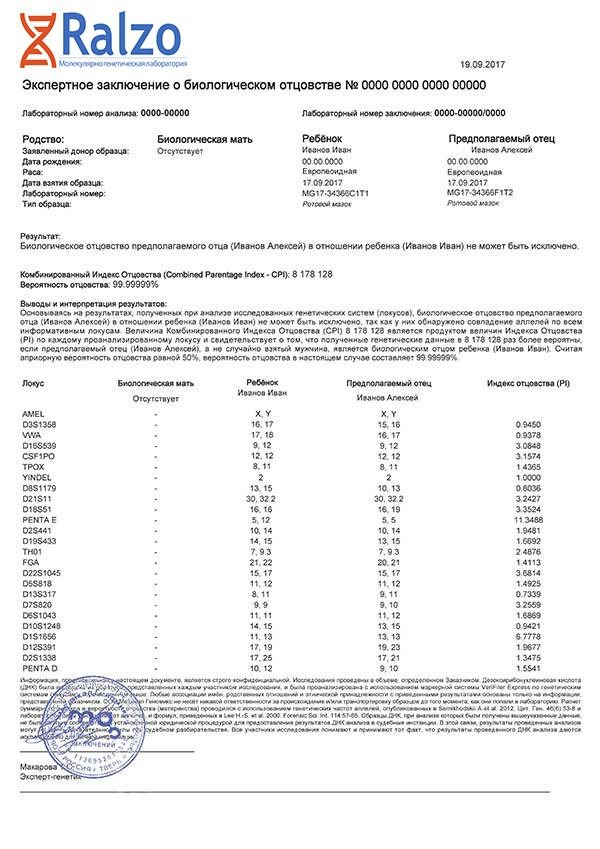
SDN test for nationality cost
SDN test for nationality cost
9900 8 000 rub.
What opportunities does such a test open up?
In contrast to verbal methods of obtaining information, as well as the use of data from incomplete or lost archival documents, a genealogical DNA test determines a person’s belonging to a haplogroup, thereby accurately identifying his ancestor who lived not 100-200 years ago, but much earlier. Given the location and historical movement of haplogroups, you can figure out your family's geographic distribution over time. This will give you a thorough understanding of your background and the unique characteristics of your family.
The test results are useful not only in historical context. They allow you to identify a wide range of contemporaries who have family ties to you that go far beyond cousins. Taking into account modern technologies, this opens up interesting prospects.
Although when forming a haplotype database, the personal information of the examined individuals is not indicated, if one wishes to make the obtained data public, this is done using open sources. For example, through social networks (23andMe), using the DNA profile of their participants. This will provide an opportunity to directly establish contact with relatives who may live on the other side of the globe and have also done genealogical analysis. For some, this will be a reason to think about documenting their origin for the purpose of further immigration.
So, genetic research of the pedigree has a solid scientific basis and opens up wide possibilities. Over time, its accuracy will only increase. This will continue to happen as new fossils become available and as more people choose to take a DNA genealogy test to find out their ancestry.
DNA test for nationality in Moscow
Establishment of kinship is carried out directly in our laboratory, thanks to which you can determine nationality by DNA at a price of 8,000 rubles. Because we are a leading laboratory and examine thousands of DNA samples per month, we are able to offer such a low price while maintaining the highest test quality. Contacting the laboratory directly allows you to significantly reduce the time it takes to complete DNA analysis for nationality.
We specialize in DNA testing for kinship and paternity. We have extensive experience and a complete understanding of the methods and methods of conducting DNA tests, and the features of the polymerase chain reaction. In consultation with laboratory specialists, you can be sure that the best DNA test option will be selected for your individual situation. You will not have to pay extra money or collect DNA samples from additional participants in cases where this is not necessary.
For a free consultation, we recommend contacting a laboratory specialist by phone.
What is examined when performing a DNA genealogy test?
The science of genealogy (which is translated from ancient Greek as “genealogy”) systematically collects information about the origin of individual families and clans, and is also the science of family ties with living people and previously living ancestors. Thus, it is characterized not only by obtaining information about an individual person, but also by the accumulation of such information throughout history. Thanks to this, we get a relatively complete picture of our origins.
For centuries, the main sources of information for establishing family ties were paper archives of official and personal documents. Information was also transmitted orally. Considering wars, fires, changes in the political system and other factors, it is difficult to expect that a sufficient amount of information has been preserved for the majority of living people to determine their origin.
Another source is family stories and legends. But you can't always rely on them either. Common forgetfulness and the desire to embellish the facts are important reasons why the truth will most likely remain an age-old mystery.
Molecular genetics has made a breakthrough in terms of obtaining a reliable source of information about one's origins. It tracks patterns of human heredity and variability based on deciphering the DNA structure. This molecule is also called “an encyclopedia written in four letters,” since all genetic information about a person is encoded by just four nucleotides: adenine, guanine, thymine and cytosine (A, G, T, C). Today, DNA is the most reliable source for obtaining information about your origin and finding relatives. Therefore, many are interested in the price of a genealogical test and the features of its implementation.
Who will need the test?
In what cases is Jewishness analysis required:
- When a child was born out of wedlock to a Jew and a non-Jew or too much time has passed, in the opinion of the Israeli Ministry of Internal Affairs, between the fact of childbirth and the registration of a legal union. In order for a child to receive citizenship, proof is required that he is really the child of this man. This procedure is not as simple as it seems. In Israel, court approval is required to conduct tests on a child. To prove Jewishness through genetic analysis, the child’s father should submit a corresponding application to the prosecutor’s office, which, in turn, sends the case to court. If the latter has authorized a DNA test for Jewishness, then it is necessary to deliver saliva samples of the father and child to the laboratory.
It is important to know: the testing itself is carried out exclusively in Israel, but it is not worth bringing the mother and child to the country for this. Most likely, they will be deployed at the border. Israeli bureaucrats have the mistaken opinion that if a woman and a child come to the country, it will be difficult to deport them from it.
- DNA confirmation of Jewishness can also help those who have little documentary evidence of their Jewish identity. But this is not exactly a test for Jewishness, since in this case the DNA of people who are, albeit distantly related, is compared. For example, this applies to stepchildren. If one child has Jewishness at birth or a more complete set of documents identifying him as a descendant of Jews, and the second does not, then Jewishness can be proven by testing the latter’s blood by determining that they are relatives. A similar analysis is accepted in all authorities that deal with issues of granting Israeli citizenship.
In other cases, conducting such tests is just a way to find out whether there is at least a small percentage of Jewish blood in the blood, so that you can then begin to study your family tree and collect bit by bit documentary evidence of nationality.
Is the result of a DNA test evidence?
If the analysis was carried out by court order to determine paternity, its results will be taken into account when considering whether the child becomes an Israeli citizen.
Perhaps the Israeli Consulate will take into account a DNA analysis confirming close family ties between the Jew and the potential repatriate.
Genetic testing for Jewish markers, dominant ethnicity, or the presence of mitochondrial DNA is not valid, even if all three tests confirm Jewish ethnicity. Certificates with test data are not proof of Jewish roots for repatriation. They can serve as a reason for a deeper study of their kind and search for documents.
Therefore, if you have done an analysis that confirms your belief in Jewish origin, you need to deepen your search for documents confirming this fact.
! Attention !
The staff of the Jewish Repatriation Agency will help resolve this issue. Our work experience and cooperation with experienced archivists help resolve even the most difficult situations. An active, professional search for documents with our help will help you move to Israel under the repatriation program.
Establishing a person's nationality for trial
There are different ways to find out your nationality - studying the family tree, archival documents and photographs of distant relatives. But even if you have all the necessary materials, it is impossible to get an accurate answer to such a question.
The only way to obtain reliable information is to undergo a laboratory examination. It should be noted that the results of such a study are accepted for consideration in courts and other government bodies when it comes, for example, to establishing paternity and alimony, determining family ties.
